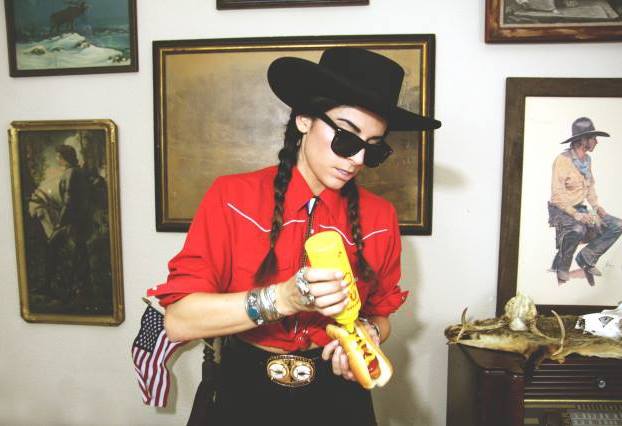Until
he passed away on January 27, Pete Seeger was a tireless advocate for civil and environmental justice. Alt-folk singer/songwriter Ani DiFranco knows this firsthand.
In a piece for The
Wall Street Journal called “Things Pete Seeger Taught Me,” she wrote that after she contacted him to appear on her new record, “he called me back the same day. In fact, he called me back twice and sent one letter my way before I even got a chance to get back to him!”
Released in 2012, that album’s title track, “Which Side Are You On?”, featuring the legendary lefty on banjo, is a slightly altered version of the union anthem Seeger helped popularize in the ’50s. To record it, the two met at the Walkabout Clearwater Sloop Club—the hub of Seeger’s Hudson River cleanup activism for decades—and he recorded his part in one take. “Good thing, too, because immediately in walked a children’s singing group to use the space for rehearsal,” DiFranco wrote. “Pete started holding court and teaching the kids the history of that song. We ended up recording everyone singing together.”
It must have been something to watch Seeger, then in his early 90s, utilize the moment to engage young people and share his love for folk music. So it went with the songwriter and pacifist, who co-opted every moment to promote the power and unity of song (as he famously did during the McCarthy era, when he was subpoenaed to testify before the House Un-American Activities Committee in 1955, and dodged questions by offering to play his banjo).
DiFranco began performing at open mikes as a teenager in Buffalo, N.Y., and not long after gained visibility for her highly personal songs tackling such topics as reproductive rights, sexuality, and personal identity. Now 43, she is a feminist icon, having garnered Grammy nominations (including one win) and countless other awards, all while self-releasing albums on her own Righteous Babe record label (alongside work by Andrew Bird, Anais Mitchell, and others) and advocating for everything from abortion rights to nuclear disarmament through her Righteous Babe Foundation.
Seeger fought incessantly, and at his own expense, for similar issues. He was blacklisted for refusing to name his associates before the HUAC, and an outspoken opponent of the Vietnam war. Through songs like “My Dirty Stream (The Hudson River Song),” his efforts to clean up the Hudson earned him extraordinary praise from the EPA.
The example is not lost on DiFranco. Her new album tests “deeper waters with the political songs,” she says. And a recent professional hurdle—a fiercely negative backlash prompted her to cancel an artist’s retreat at a former slave plantation—was handled with the contemplative repose of a figurehead long used to crossfire and the lessons it yields.
“You were right,” she wrote to fans and critics on the Righteous Babe site after she canceled the event. “We can’t in good conscience go to that place and support it or look past for one moment what it deeply represents. I needed a wake-up call and you gave it to me.”
In his later years, Seeger similarly came to rethink his early support of communism (in an interview with The
New York Times Magazine, he apologized for “following the party line so slavishly, for not seeing that Stalin was a supremely cruel misleader”). Yet for radical thinkers and doers, the personal is the political and vice versa, and those lines can get blurry. The takeaway, DiFranco wrote, is that “Pete taught me that it is not enough to do good work. You have to do it with the right spirit or it is no good at all.”
But now what?—now that Seeger is gone, and Bob Dylan, whose early work he championed, is shilling for Chrysler?
DiFranco is back in the studio, of course. “Pete was a great comrade to me and I tried to be a good comrade in return, to come when he called,” she wrote. “[He] taught me that to be a good activist, you have to do it yourself and you have to do it now.”
gelliott@seattleweekly.com
ANI DIFRANCO With Jenny Schienman. The Moore, 1932 Second Ave., 467-5510, stgpresents.org/moore. $35 adv./$40 DOS. 7:30 p.m. Sat., Feb. 22.








